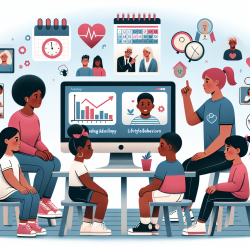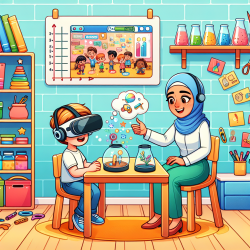Academic Professional: Implementing Research Outcomes to Improve Online Therapy for Children

The transition from school to adulthood is a pivotal period for young adults with intellectual disabilities, often characterized by significant changes in lifestyle behaviors. A recent feasibility study, titled ‘Moving on and feeling good’: a feasibility study to explore the lifestyle behaviours of young adults with intellectual disabilities as they transition from school to adulthood—a study protocol, offers critical insights that can help practitioners enhance their skills and create better outcomes for children.The study's key findings underscore the importance of understanding and supporting lifestyle behaviors during this transition. Here’s how practitioners can implement these findings in their practice:
1. Understanding the Risk Factors
The study highlights that young adults with intellectual disabilities are at a higher risk of obesity and sedentary behavior compared to their peers. This period of transition is especially critical as it often involves leaving behind a structured school environment. Practitioners should:
- Monitor changes in weight, diet, and physical activity levels regularly.
- Use tools like accelerometers to objectively measure physical activity over a period of time.
- Employ dietary assessment tools such as the DINE food frequency questionnaire and 24-hour recall methods.
2. Promoting Self-Determination
Self-determination is a significant factor influencing lifestyle behaviors. The study uses a socio-ecological model to identify environmental mediators that affect self-determination. Practitioners should:
- Encourage autonomy by involving young adults in decision-making about their diet and physical activities.
- Provide resources and support to help them make informed choices.
- Work with families and caregivers to ensure they support and not hinder self-determined behaviors.
3. Addressing Social and Environmental Factors
The research emphasizes the role of social and environmental factors in shaping lifestyle behaviors. Practitioners can:
- Foster social inclusion by creating opportunities for young adults to engage in physical activities with peers.
- Address barriers such as lack of motivation or time among caregivers by providing targeted interventions.
- Utilize community resources to create a supportive environment for healthy lifestyle choices.
4. Longitudinal Monitoring and Follow-Up
The feasibility study suggests that long-term monitoring is crucial for understanding and supporting lifestyle behaviors. Practitioners should:
- Implement longitudinal studies to track changes over time and adapt interventions accordingly.
- Use semi-structured interviews to gather qualitative data on psychological, social, and environmental factors.
- Incorporate feedback from young adults and their families to continuously improve intervention strategies.
Encouraging Further Research
While this feasibility study provides a solid foundation, there is a need for further research to develop and test interventions aimed at preventing weight gain and promoting healthy lifestyle behaviors. Practitioners are encouraged to:
- Participate in or initiate research projects that build on these findings.
- Collaborate with academic institutions to pilot new interventions.
- Share insights and data to contribute to the growing body of knowledge in this field.
By implementing these strategies, practitioners can make data-driven decisions that significantly improve the outcomes for young adults with intellectual disabilities as they transition to adulthood. To read the original research paper, please follow this link:
‘Moving on and feeling good’: a feasibility study to explore the lifestyle behaviours of young adults with intellectual disabilities as they transition from school to adulthood—a study protocol.
Citation: Mitchell, F., Jahoda, A., Hankey, C., Matthews, L., Murray, H., & Melville, C. (2016). ‘Moving on and feeling good’: a feasibility study to explore the lifestyle behaviours of young adults with intellectual disabilities as they transition from school to adulthood—a study protocol. Pilot and Feasibility Studies, 2, 8. https://doi.org/10.1186/s40814-015-0044-9










